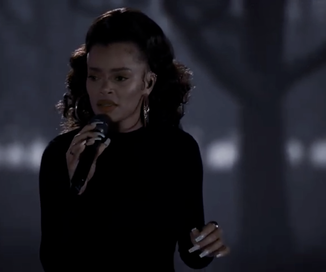 Screenshot Screenshot by Julian Spivey The Grammy’s Salute to the Sounds of Change two-hour concert special aired on CBS on Wednesday, March 17 and featured numerous great performances, but also featured some curious omissions. “Sounds of Change” is a broad topic, but the show did a good job of trying to get performances into the show involving civil rights, LGBTQ rights, women’s rights, as well as anti-war songs. The special was hosted by Grammy and Oscar-winning rapper Common, who did a good job at interweaving stories about the performances and showing past clips of historical moments captured during past Grammy Award telecasts like Aretha Franklin performing Simon & Garfunkel’s “Bridge Over Troubled Water” and the memorable performances some years back of “Same Love” by Macklemore and Ryan Lewis featuring Mary Lambert and Madonna in which many couples were married live on the Grammys by Queen Latifah as officiant. Singer and actress Cynthia Erivo kicked off the performances on the evening with a nice cover of John Lennon’s 1971 classic “Imagine,” which longs for a world full of love and without any evils. Smooth voiced Chris Stapleton crooned a nice version of Louis Armstrong’s “What A Wonderful World,” though it was an interesting choice given some of the classic “songs of change” that were left out of the special, but I’ll have more on that in a bit. I was happy to see Loretta Lynn’s “The Pill,” a controversial song of its time about how women now had a choice when it came to having babies or not, featured and while LeAnn Rimes did a fine job on the song her vocals were occasionally drowned out by the backing band doing a more rocking version of the song. Potentially the best performance of the evening was Andra Day performing Billie Holiday’s incredibly important anti-lynching ballad “Strange Fruit,” which truly altered her career and life. Day recently won a Golden Globe award for portraying Holiday in Lee Daniels’ new film “The United States vs. Billie Holiday,” which is Day’s film debut and can be seen now on Hulu. Most performances during the special were straight forward covers, but reigning Country Music Association Entertainer of the Year Eric Church, one who’s never afraid of trying something new put a funky take on Edwin Starr’s 1970 anti-war classic “War.” My personal favorite segment of the special was John Fogerty’s two-song set of “Weeping in the Promised Land” and “Fortunate Son.” The performance began with Fogerty on the piano with accompaniment from a gospel choir doing “Weeping in the Promised Land,” a brand new song he released in early January about the struggles faced in the country over the last half decade or so. He then performed a terrifically full-bad rock performance of “Fortunate War,” his anti-Vietnam song from the late ‘60s that took on the well-to-do establishment that sent less fortunate young men to die for a war the country never should’ve been in to begin with. Another favorite performance of mine came toward the end of the program when Brad Paisley performed “Welcome to the Future,” from his 2009 album American Saturday Night, which was inspired by the 2008 Presidential election of Barack Obama as the first African-American President in U.S. history. It’s a terrific song, but I’d be remised if I didn’t say the last decade or so has shown this country still has plenty far to go before things are close to being equal, but it’s definitely a reminder that in some ways they are better than they once were. Other fantastic performances during the special included Patti LaBelle performing Leslie Gore’s 1963 hit “You Don’t Own Me,” which came out almost a full decade before the feminist movement, and Gladys Knight performing the Marvin Gaye classic “What’s Going On.” Emmy-winning actor Billy Porter’s performance of LaBelle’s “You Are My Friend” was also a touching moment as Porter talked about how sometimes close friends truly become your family and how big of a thing this is within the LGBTQ community. My biggest complaint of the Grammy’s Salute to the Sounds of Change was what was left out, rather than what was actually performed on the show. When I think of “sounds of change” within music there are a few performers I automatically think of – Bob Dylan and Woody Guthrie. Neither of these artists had songs covered on the program, though Dylan was briefly mentioned, as well as Guthrie’s “This Land Is Your Land,” which I genuinely believe should be adopted as the new National Anthem of this country. The ‘Sounds of Change’ special ended with an upbeat gospel performance by Yolanda Adams doing the civil rights anthem “We Shall Overcome,” which has been a major song of change for more than a century and remains as relevant today as it ever has.
0 Comments
Leave a Reply. |
Archives
April 2024
|